Controversy follows recent pattern of anti-vaxers embracing Holocaust imagery in the U.S. and across Europe

By Nika Aleksejeva
Aldis Gobzems, a popular Latvian opposition politician known for his opposition to COVID-19 prevention policies such as masks and vaccines, has embraced the growing trend of anti-vaxxers wearing yellow Stars of David to compare public health-motivated restrictions that unvaccinated people in Latvia face to the Holocaust. A Latvian online shop followed suit by selling t-shirts and other products sporting a Star of David and the word “unvaccinated” imprinted on them. The products has since been removed.
The symbol of the Star of David that notoriously was used by the Nazis to identify Jews has previously appeared in anti-vax movements in other parts of Europe, including Germany, Czech Republic, the UK and elsewhere. It has also become a recurring controversy in the United States, where politicians and stores have received enormous backlash for embracing similar imagery. In Latvia, Gobzems was possibly inspired by Yegor Beroev, a Russian actor who made a speech in June 2021 about social segregation of vaccinated and unvaccinated people in Russia while wearing a yellow star pinned on his jacket.
The comparison of public health-motivated restrictions for the unvaccinated with actual genocide has been harshly criticized by both the American and Latvian Jewish community, among others around the world. Now this rhetoric has spread to Latvia and one of its most controversial politicians, but without widespread adoption by the public at large.
Gobzems’ Facebook posts
The first time Gobzems used the Star of David as a symbol of discrimination against unvaccinated people was on June 25, 2021. In his post, he wrote, “INVITATION to the public to listen, read, join! I was not vaccinated against the dangerous, so I put a yellow star. Symbolically. If necessary, I will not go on the sidewalk either.” “The dangerous” is a term Goblemz uses to mock COVID-19, while his reference to sidewalks hearkens back to Jews in Latvia being forbidden to use pedestrian sidewalks during Nazi occupation.
By June 30, Gobzems had used the symbol in at least six Facebook posts, though in several of these he changed the color and shape of the star.
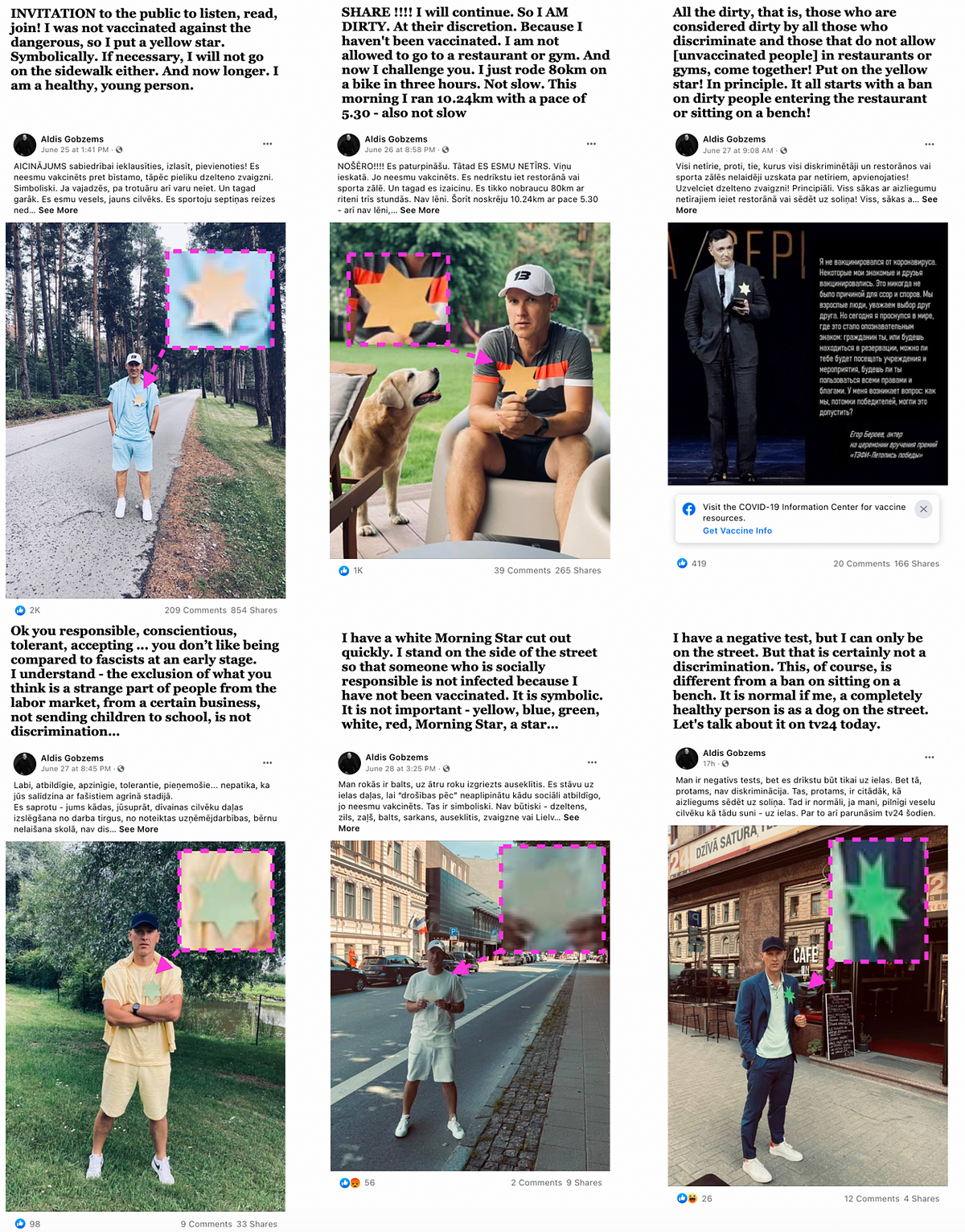
The change in shape and color could be due to the backlash against Gobzems’ comparisons. The Latvian Jewish community condemned Gobzems for the misuse of the yellow star in a statement posted on their webpage:
The stigmatization of Jews with yellow or other colors marked the doom of death that was part of a Nazi racial policy aimed at the total extermination of Jews. The current restrictions in Latvia apply to visits to places of entertainment, but in no way affect the social status of people and certainly do not imply that of a member of society is determined to be arrested and killed.
Christian Heldt, Germany’s ambassador in Latvia, condemned Gobzems’ misuse of the yellow star on Twitter.
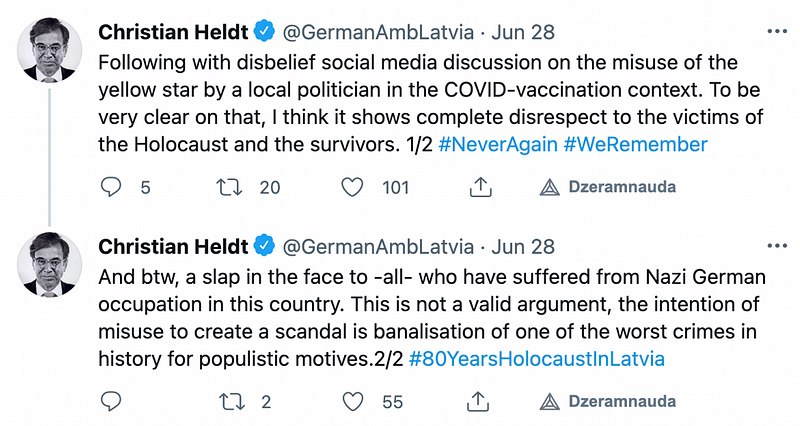
Additionally, on June 29, five Latvian parliamentarians issued a complain about Gobzems’ misuse of the Holocaust symbol to Latvian Parliament’s Commission of Mandates and Ethics, as Gobzems’ posts may have offended parts of Latvian society.
Gobzems complains of being “banned”
On June 28, Gobzems posted on Facebook that the platform had “banned” him, probably meaning that Facebook blocked one of his posts rather than his account, since he was clearly able to post the message about it. In the post in question, according to Gobzems, he had asked the Latvian government to offer insurance for COVID-19 vaccine side effects. Gobzems also connected the Facebook “ban” with his comparison of unvaccinated people with Holocaust victims.
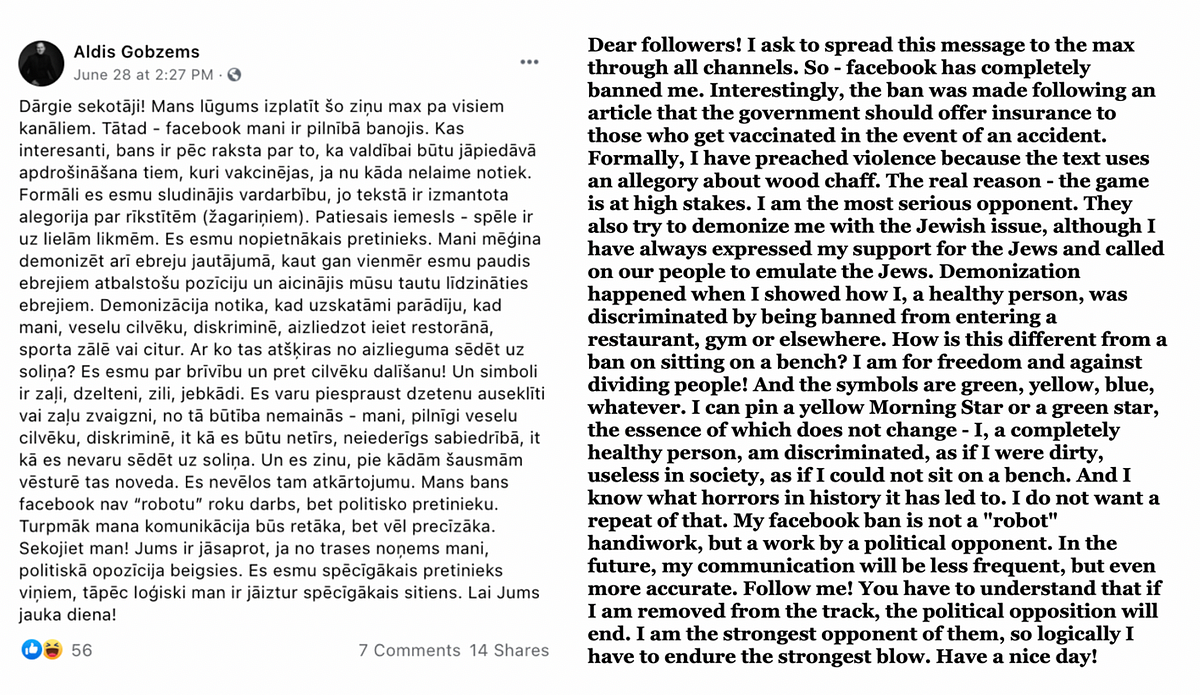
While Gobzems’ account remains accessible on Facebook, engagement with his posts has visibly decreased in recent days. Data from the Facebook analysis tool CrowdTangle shows a drop in engagement since June 25, when Gobzems first posted about the Star of David and unvaccinated people. Though his engagement rates have cycled up and down with his posting habits, this drop has lasted longer than recent ones, though it remains to be seen if it is cyclical as well.
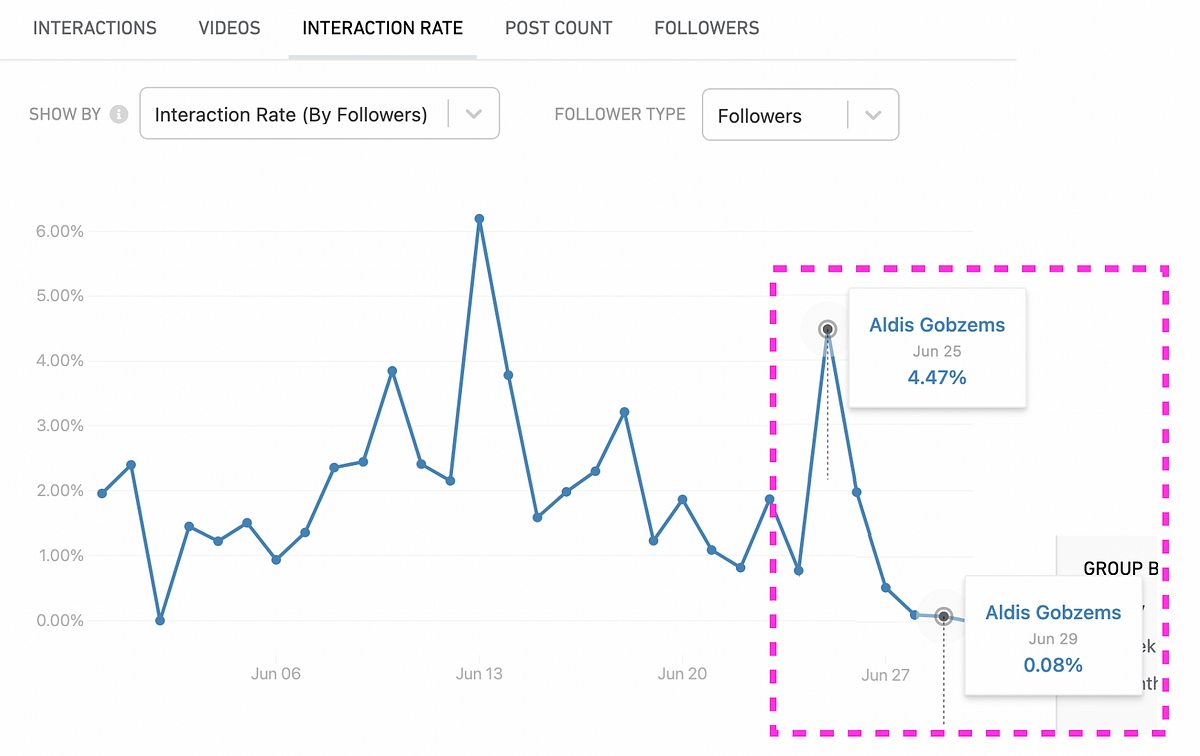
While his first post on June 25 garnered 1,999 likes, 209 comments and 854 shares, a similar post on June 27 garnered saw its engagement drop by over 95 percent.

Holocaust imagery as merchandise
On June 27, 2021, Gobzems tweeted an image of a man wearing a t-shirt with a yellow star and the word “unvaccinated” written in Latvian on it. The image matched one used on a Latvian online store called A-Z.WEBSTORE.
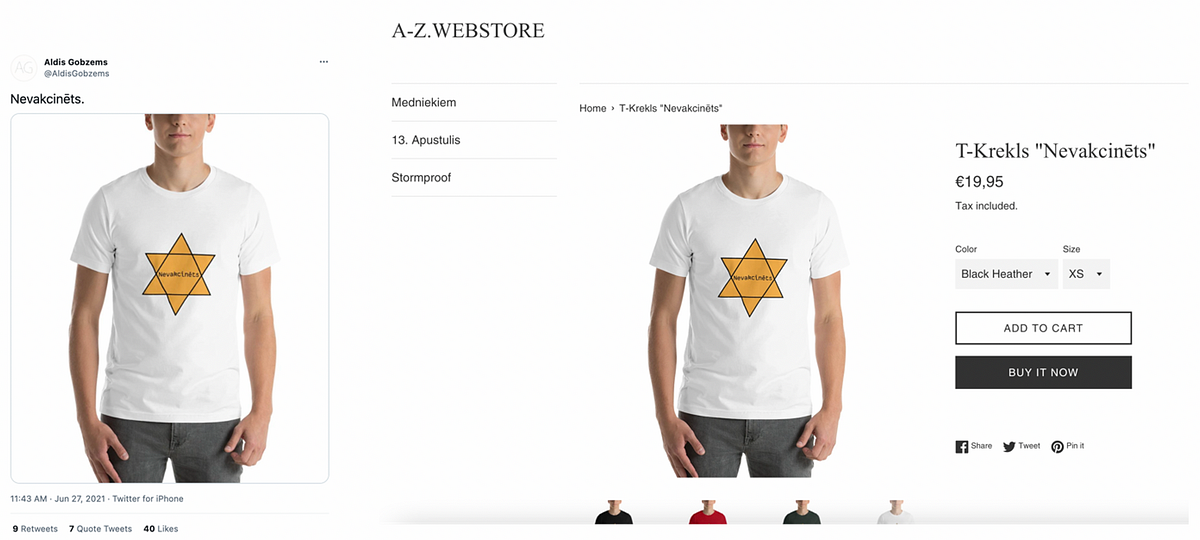
Besides the t-shirts, the store sold phone covers with the same symbol and word “unvaccinated” written in Latvian and German on it. They have since been removed. These products are similar to ones previously offered on Amazon until they too were taken down.
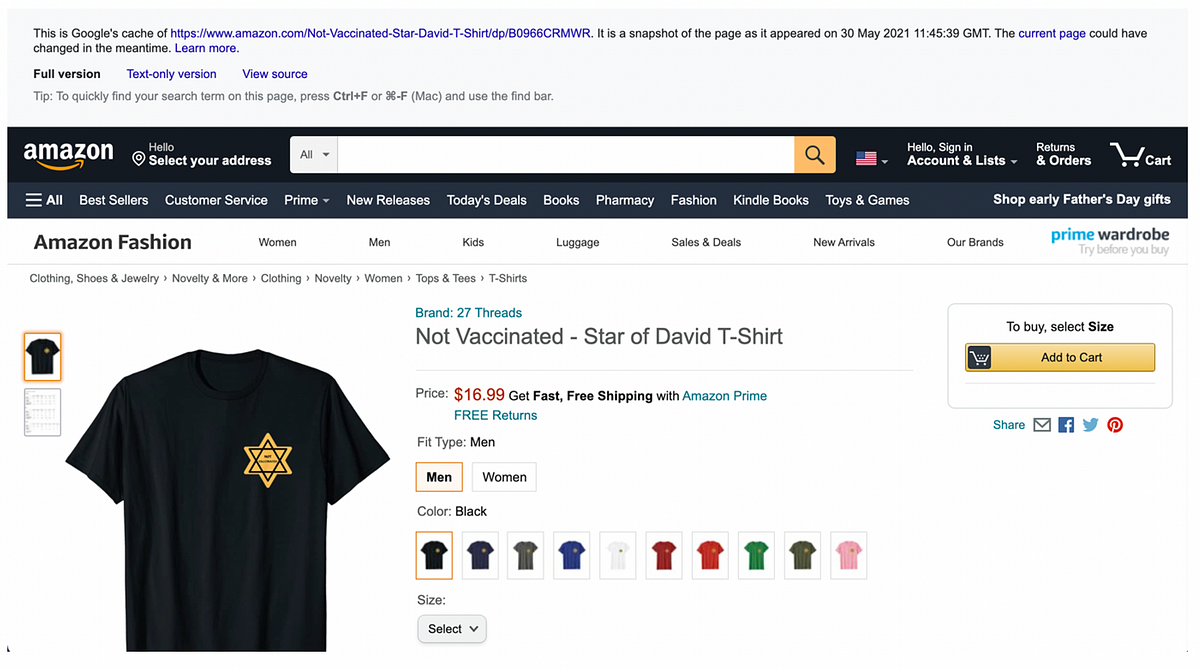
A lack of traction
The DFRLab looked for other Latvian users independently embracing Holocaust imagery in the context of COVID vaccines and did not find many posts. Among them were two posts on Twitter and one on Facebook. This suggests that Gobzems’ efforts, while attracting public controversy, have not been successful at attracting a wide audience.
Additionally, the link to the webstore that sold the t-shirt received just 17 shares on Facebook and three shares on Twitter, according to BuzzSumo, the social media listening tool.
While the misappropriation of the Star of David by the anti-vax community predates the COVID-19 pandemic, it has taken on new life around the world since COVID vaccines first became available. But the comparison of health-motivated restrictions for unvaccinated people with the Holocaust has not been well received in Latvia and other European nations in which the Second World War remains a painful living memory.
Nika Aleksejeva is a Research Associate, Baltics, with the Digital Forensic Research Lab.
Cite this case study:
Nika Aleksejeva, “Latvian politician faces digital backlash for using Star of David as anti-vax symbol,” Digital Forensic Research Lab (DFRLab), July 1, 2021, https://medium.com/dfrlab/latvian-politician-faces-digital-backlash-for-using-star-of-david-as-anti-vax-symbol-30ed90e138de.
Follow along for more in-depth analysis from our #DigitalSherlocks.

